I’ve been back from my latest trip to Papua New Guinea for almost two months now. I’ve been working on writing about the changes in me that those trips have brought about, but I haven’t quite completed figuring the whole thing out – but soon, it’s just on the tip of my tongue.
After being out on the sea for three months out of five (before these two months at home), life in the kampung has gotten a bit ho-hum. Everyday is the same: get up, play with Zoey before school, get her off to school, clean the house, play with Zoey after school, do a little reading and writing, play with Zoey again while my wife makes dinner, eat dinner, watch tv and sleep, Reset and do it all again tomorrow.
Now, that’s actually not a bad life. I don’t have to work; I wouldn’t mind having some extra money, but we have enough to get by on, and for me that’s cool. I have a great bunch of kids and grandkids. Somehow all the neurological problems that I had a few years back after a stroke have disappeared. I live on a tropical island, which I’ve wanted to do since I was in high school. I speak two languages and bits of three or four other ones. I have a beautiful and extremely challenging wife. I have a completely strange and blind monkey that I would love more if he didn’t insist on peeing on me.
So, what I have always needed when I get these stay-at-home blues is a road trip, and where else to make a trip other than to Ubud to visit some old friends and see what the Yoga capital of the world is up to these days. Really the trip is not just about visiting friend or getting out of the house. It’s as much about seeing Bali. Getting out to the villages and the small roadside warungs and life outside of tourism central.
Life on this small island now regularly called a resort island (how ugly can we get) has always been about what happens with the masyarakat (the people). All the rest is window dressing for anthropologists, royalty-struck tourist hangers-on, and, of course, the wealthy and connected. And for me, the best way to get to see what is going on around the island is to head out on my motorcycle and make a few stops along the way to chat with folks. The destination of Ubud is really of secondary importance to the physical act of the ride over these twisty roads that run through some of the best of traditional Balinese villages.
The weather on the trip down and back was beautiful: clear skies, a slight breeze and that Balinese sun to keep me warm when I got up into the mountains just before Kintamani.
These trips give me a chance to let the thoughts flow freely, unencumbered by the daily trivia of life back home. My children call these trips “refreshing,” and while I used to think that was kind of a strange way to put it, it’s actually the perfect word to describe what happens when I get out on the road. On  this trip, I was playing with the concept of consciousness (not in the sense of how some of the new arrivals to Bali use it, such as in “Oh ya, I’m a conscious person,” but in the scientific sense of the word.) Consciousness is a favorite concept to think about just because of the act of perceiving and thinking about the beauty found around Bali on the way up to Ubud from Singaraja. The sense of being in the world can be really startling when immersed in the lushness of a tropical island.
this trip, I was playing with the concept of consciousness (not in the sense of how some of the new arrivals to Bali use it, such as in “Oh ya, I’m a conscious person,” but in the scientific sense of the word.) Consciousness is a favorite concept to think about just because of the act of perceiving and thinking about the beauty found around Bali on the way up to Ubud from Singaraja. The sense of being in the world can be really startling when immersed in the lushness of a tropical island.
By the end of the drive, I was, as is said, refreshed. Down in Ubud, things are as busy as usual; the tourist season really doesn’t exist anymore for Ubud, it’s always the tourist season. The narrow sidewalks that were once a pleasure to stroll along in early May before the onslaught of the traditional tourist season that began in June, now are packed in early May with the wandering hordes of tourist walking two or three abreast making it difficult to do an absent-minded stroll. Seems like there is always someone pushing you off towards the street, which is extremely hazardous with all the traffic in Ubud these days.
I had a chance to catch-up with the Balinese family that I have been staying with for the past 29 years, as well as spe nding a pleasant afternoon catching up with an old American friend and his Balinese wife. And, as usual, I did my shopping tour through town to get a few things for Zoey, Zander and Su. I made my obligatory stop at Ganesha Books to get Zoey a few books, and I succumbed to the desire to spend a quiet evening in my room by ordering a pizza from a local restaurant.
nding a pleasant afternoon catching up with an old American friend and his Balinese wife. And, as usual, I did my shopping tour through town to get a few things for Zoey, Zander and Su. I made my obligatory stop at Ganesha Books to get Zoey a few books, and I succumbed to the desire to spend a quiet evening in my room by ordering a pizza from a local restaurant.
Getting out of town is for me a chance to get out of a few of the daily routines, and this trip was successful and pleasant. And now back home to start on some new projects.





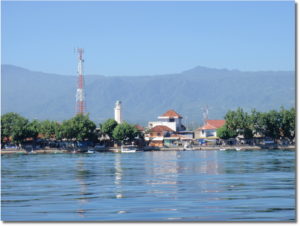
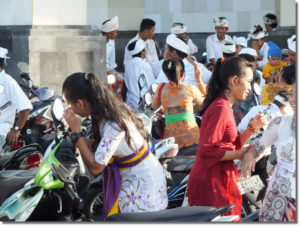 The answer is that there is no answer – it all depends on what you bring to Bali and where you take it. There are foreigners who have come to Kuta and have never left. The excitement, opportunity and midnight rush have seduced them into finding a way to build a life there. Sanur, a twenty minute ride from Kuta, is a more relaxed village catering to generally more upscale tourists. Then, too, there are the tourists who come and drink, dance, spend and flee looking for one more country or island to “do.” Come up to the north and you might find boredom or bliss. Quiet sunsets on Lovina or Anturan Beach, serene walks in scenic villages. Try Ubud, the fabled center of Balinese ‘culture,” and you may find fantastic artists and musicians, thrilling performances of ancient dances and plays, or you may find digital nomads wandering the street half-naked, rabid dogs, muddy pathways and cold showers.
The answer is that there is no answer – it all depends on what you bring to Bali and where you take it. There are foreigners who have come to Kuta and have never left. The excitement, opportunity and midnight rush have seduced them into finding a way to build a life there. Sanur, a twenty minute ride from Kuta, is a more relaxed village catering to generally more upscale tourists. Then, too, there are the tourists who come and drink, dance, spend and flee looking for one more country or island to “do.” Come up to the north and you might find boredom or bliss. Quiet sunsets on Lovina or Anturan Beach, serene walks in scenic villages. Try Ubud, the fabled center of Balinese ‘culture,” and you may find fantastic artists and musicians, thrilling performances of ancient dances and plays, or you may find digital nomads wandering the street half-naked, rabid dogs, muddy pathways and cold showers.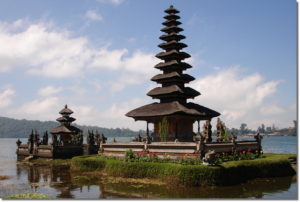 Bali. I first heard of the legendary Indonesian island during my freshman year at the University of Illinois in my Introduction to Cultural Anthropology course. Years later, I was a teaching associate in the anthropology department at UC Berkeley teaching an introductory anthropology course with Bali as one of the culture areas. And, while I had never been to Bali, my readings and lectures lit the desire to visit this island about which so much had been written just to see what the fuss was really about. As these things sometimes go, not long after I was offered a teaching position in a mining company on the island of New Guinea – not all that far from Bali. The fulfillment of my desire was just on the horizon. When I left San Francisco in 1989, I never imagined that I would still be living overseas 28 years later. As the Grateful Dead say, it’s been a long, strange trip.
Bali. I first heard of the legendary Indonesian island during my freshman year at the University of Illinois in my Introduction to Cultural Anthropology course. Years later, I was a teaching associate in the anthropology department at UC Berkeley teaching an introductory anthropology course with Bali as one of the culture areas. And, while I had never been to Bali, my readings and lectures lit the desire to visit this island about which so much had been written just to see what the fuss was really about. As these things sometimes go, not long after I was offered a teaching position in a mining company on the island of New Guinea – not all that far from Bali. The fulfillment of my desire was just on the horizon. When I left San Francisco in 1989, I never imagined that I would still be living overseas 28 years later. As the Grateful Dead say, it’s been a long, strange trip.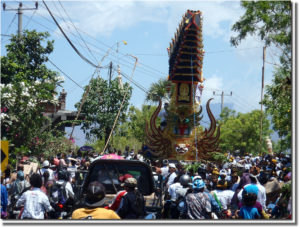 Being one of the old-timers now on the island, I tend to get lulled into thinking about how much better the island was before tourism boomed – there were plenty of tourists when I first came here, but every year the numbers go up and in some parts of the island – Ubud and the Kuta/Legian/Seminyak area in particular – high season just means even more tourists than usual. We like to talk about the adventure that life here was back then when many places still had no electricity, it was more common to drink warm beer than cold, streets in the villages would turn into streams of mud during the rainy season, and you never knew what strange thing you might find around the next bend in the road.
Being one of the old-timers now on the island, I tend to get lulled into thinking about how much better the island was before tourism boomed – there were plenty of tourists when I first came here, but every year the numbers go up and in some parts of the island – Ubud and the Kuta/Legian/Seminyak area in particular – high season just means even more tourists than usual. We like to talk about the adventure that life here was back then when many places still had no electricity, it was more common to drink warm beer than cold, streets in the villages would turn into streams of mud during the rainy season, and you never knew what strange thing you might find around the next bend in the road. 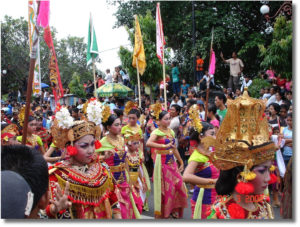 Thinking about the lost, the real and the imagined Bali.
Thinking about the lost, the real and the imagined Bali.  So why have I stayed in Bali and not gone back to the States or off to another country around the world? Serendipity is one short answer. A close American friend and long-time Bali resident has the saying: many are called, few are chosen. Without getting overly mystical, I felt a pull here within the first month that I was here. Not as soon as I arrived; I stayed my first week in Kuta and while it was a welcome break from life in the mining camp where I lived, it was not what I had hoped to find here. But slowly over the month of my vacation my perception of Bali developed. It was a combination of the natural beauty of Bali and the friendships that I developed with Balinese. It happened when the giddy edge of exotic strangeness started to wear off and a feeling of normality set in. It was then that I realized that I wanted to live here permanently. It wasn’t cheap living, it wasn’t being able to build a “villa,” (never been there, never done that), it wasn’t having a “staff” to cater to my every need, it wasn’t even because of a woman (I had already set my mind to living here permanently before I met the lovely Suhana). It was that mystical something that drew me here and keeps me here.
So why have I stayed in Bali and not gone back to the States or off to another country around the world? Serendipity is one short answer. A close American friend and long-time Bali resident has the saying: many are called, few are chosen. Without getting overly mystical, I felt a pull here within the first month that I was here. Not as soon as I arrived; I stayed my first week in Kuta and while it was a welcome break from life in the mining camp where I lived, it was not what I had hoped to find here. But slowly over the month of my vacation my perception of Bali developed. It was a combination of the natural beauty of Bali and the friendships that I developed with Balinese. It happened when the giddy edge of exotic strangeness started to wear off and a feeling of normality set in. It was then that I realized that I wanted to live here permanently. It wasn’t cheap living, it wasn’t being able to build a “villa,” (never been there, never done that), it wasn’t having a “staff” to cater to my every need, it wasn’t even because of a woman (I had already set my mind to living here permanently before I met the lovely Suhana). It was that mystical something that drew me here and keeps me here.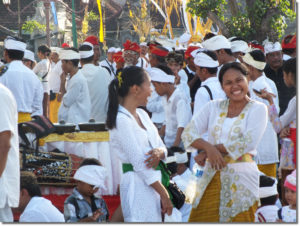 We imagine what we’d like to see when we travel. In the days before social networking, smart phones and instant images that can be transmitted across the globe in seconds, tourists would develop mental images of what they might meet upon entering a foreign country, then those imagined images would be adjusted to the reality. Now we can see our hotel room online, read updated reviews of the restaurant, check out the toilet facilities, see who our neighbor is going to be on the airplane, view anything and everything in a 360 degree total surround sound view. Traveling around to exotic locales isn’t what it used to be in terms of adventure, but for those of us who have been around this tropical “paradise” for a long time, we need to remind ourselves that others arrived here before us and said pretty much the same things that we say now. We just need to remember that the beauty of the island is not just in a startling sunset or a lush paddy but in the dignity and strength of the people that live here.
We imagine what we’d like to see when we travel. In the days before social networking, smart phones and instant images that can be transmitted across the globe in seconds, tourists would develop mental images of what they might meet upon entering a foreign country, then those imagined images would be adjusted to the reality. Now we can see our hotel room online, read updated reviews of the restaurant, check out the toilet facilities, see who our neighbor is going to be on the airplane, view anything and everything in a 360 degree total surround sound view. Traveling around to exotic locales isn’t what it used to be in terms of adventure, but for those of us who have been around this tropical “paradise” for a long time, we need to remind ourselves that others arrived here before us and said pretty much the same things that we say now. We just need to remember that the beauty of the island is not just in a startling sunset or a lush paddy but in the dignity and strength of the people that live here. Getting out on the road in Bali just before dawn is one of my special loves. The air is fresh; a gauzy haze blankets the countryside; small, wood cooking fires send up snake-like streams of smoke from dozens of kitchens along the rural roads that add the hint of an exotic smell to the morning crispness. Markets are busy with a mess of motorbikes, trucks, cars, bicycles and pedestrians all maneuvering for space. The earliest and most eager students begin to appear alongside the rode ready to begin another school day.
Getting out on the road in Bali just before dawn is one of my special loves. The air is fresh; a gauzy haze blankets the countryside; small, wood cooking fires send up snake-like streams of smoke from dozens of kitchens along the rural roads that add the hint of an exotic smell to the morning crispness. Markets are busy with a mess of motorbikes, trucks, cars, bicycles and pedestrians all maneuvering for space. The earliest and most eager students begin to appear alongside the rode ready to begin another school day.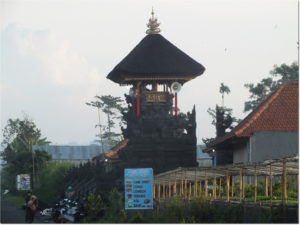 The road from Ubud to Kintamani via Tegallalang is mix of stretches of new, smooth asphalt and crumbly, potholed rubble. It’s better now though than in the past and it lends itself to a reflective drive – on cruise control most of the time as the early morning traffic thins out once past Tegallalang.
The road from Ubud to Kintamani via Tegallalang is mix of stretches of new, smooth asphalt and crumbly, potholed rubble. It’s better now though than in the past and it lends itself to a reflective drive – on cruise control most of the time as the early morning traffic thins out once past Tegallalang.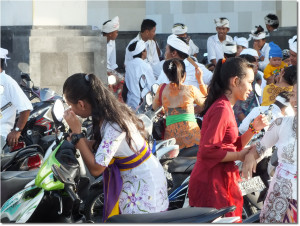 I’ve been thinking about the question that is posed to me now and again (probably more frequently than now and again when I come to think about it) about why I live in Bali. I was just reading some comments on an expat forum where several members were discussing how much they disliked Bali now after living here for some time, with one writer being literate enough to sum it all up as “Bali sucks.” OK, the emotion there was pretty clear, and the frustrations that expats sometimes feel here aren’t just made up: there are lots of frustrations to life in Bali that can wear on people like traffic, corruption, visa problems, the education system, lack of an infrastructure sufficient for the population size, poor health care, scam artists and on and on. The issue is how to deal with these frustrations of everyday life, if indeed someone wants to deal with it at all.
I’ve been thinking about the question that is posed to me now and again (probably more frequently than now and again when I come to think about it) about why I live in Bali. I was just reading some comments on an expat forum where several members were discussing how much they disliked Bali now after living here for some time, with one writer being literate enough to sum it all up as “Bali sucks.” OK, the emotion there was pretty clear, and the frustrations that expats sometimes feel here aren’t just made up: there are lots of frustrations to life in Bali that can wear on people like traffic, corruption, visa problems, the education system, lack of an infrastructure sufficient for the population size, poor health care, scam artists and on and on. The issue is how to deal with these frustrations of everyday life, if indeed someone wants to deal with it at all.
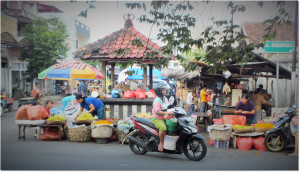 As I mentioned to a friend recently, restaurant delivery is one of the things that I’ve always considered to be part of the new Western-fueled decadence of Ubud. This may not seem like the end of the world, but for me ordering a pizza, or anything else, seems like an unalterable concession to the tidal wave of the Westernization of Ubud. That being said, if the Balinese are OK with it, then I’m just going to have to go along with it. After all, I’m in favor of McDonald’s and KFC and Burger King coming here if that’s what the local population wants. So if the Balinese or other Indonesian residents of Ubud think that delivery service is the bee’s knees, then I guess that I can order a late night pizza for delivery to my favorite homestay without guilt. On the other hand, guilt may just be one of those little pleasures of life that I enjoy so much. And maybe it’s time for me to accept some of the changes happening on this little island.
As I mentioned to a friend recently, restaurant delivery is one of the things that I’ve always considered to be part of the new Western-fueled decadence of Ubud. This may not seem like the end of the world, but for me ordering a pizza, or anything else, seems like an unalterable concession to the tidal wave of the Westernization of Ubud. That being said, if the Balinese are OK with it, then I’m just going to have to go along with it. After all, I’m in favor of McDonald’s and KFC and Burger King coming here if that’s what the local population wants. So if the Balinese or other Indonesian residents of Ubud think that delivery service is the bee’s knees, then I guess that I can order a late night pizza for delivery to my favorite homestay without guilt. On the other hand, guilt may just be one of those little pleasures of life that I enjoy so much. And maybe it’s time for me to accept some of the changes happening on this little island.